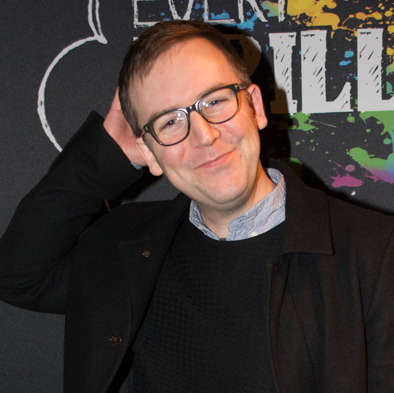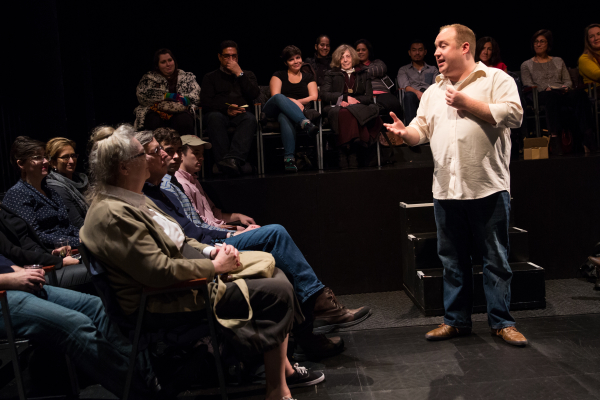Duncan MacMillan Tackles Depression and Suicide in His New Comedy, Every Brilliant Thing
The solo show comes to New York’s Barrow Street Theatre after acclaimed runs in Europe.

(© Timmy Blupe)
"You're six. Mum's in hospital. Dad says she's 'done something stupid.' She finds it hard to be happy. You start to make a list of everything that's brilliant about the world. Everything that's worth living for."
Thus begins the description of Every Brilliant Thing, a new solo show by the U.K.-based playwright Duncan MacMillan at the Barrow Street Theatre. It's a life-affirming play that tackles several very difficult subjects, namely suicide and depression, infuses it with comedy, and adds an element of audience participation. MacMillan recently chatted with TheaterMania about his need to articulate this subject matter and his desire to leave audiences feeling like they're not alone.
For a play that's about depression and suicide, Every Brilliant Thing is awfully funny. Would you classify it as "a comedy about suicide"?
A comedy about suicide…I don't know what I'd make of that as a logline. It's far more complicated. It's really about, How do we live on earth as a human being? Which is what all drama is about. It hopefully makes you feel uplifted. It's not a schmaltzy, sentimental show. It hopefully articulates the complexity of being alive, and makes you feel glad.
How was this piece developed? I understand it was based on a short story you wrote?
It was based on a short story, written as a gift for a wonderful actress who was in my first play in the London Fringe and had no lines. I had the opportunity to write the monologue, the short story, for her. It was supposed to be a one-off event and then she was invited to do a whole run of it. And then I was asked to do a one-off night, and then asked [to do it] again by [director] George Perrin. George and I have been working on how to make the story into a show for years. It's been through a lot of versions, and now we've got [performer] Jonny Donahoe, who's making it his own by rewriting it and making it fresh every night.
How much of the play's improvisatory feel is owed to Jonny?
There's no one quite like him. I'm curious to see if we ever do this show again, partly because it's so close to him, and so structured around his inventions, as well. He's a stand-up comedian who's never been in a play before. He's an incredibly generous performer; he makes people feel safe and able to participate. It's quite a rare gift to do that. He's extraordinarily quick. A really important variable in this show is that it will be different every single time. Part of the joy is him.
Why write a play about this particular subject matter?
The gesture behind the show is to find the way to talk about the most serious things you could talk about in a way that isn't serious. We feel passionately that there's something missing from our culture in discussions of mental health, particularly when it comes to suicidal depression. In the media, depression in general is either treated as a complete taboo and ignored, or it's fetishized and glamorized. You never hear about the people who work a nine-to-five and take their own life; you hear about the artists and the singers and the models. Neither of them is accurate or helpful. The show is about finding a form in which we can come together as a group of people and think of this in a way that's completely safe and empowering.
At what point did you realize you had a show that touches people's lives?
Really early on, we would develop it in village halls for audiences of fifteen people. We did some surveys with people and were really astonished that out of a room of thirty, the number of people that said, "I had this happen in my life," was absolutely extraordinary. They were really grateful for something that dealt with [the subject] in a really personal way, but didn't feel exploitative. It really struck home, and we were a little bit more emboldened by it.

(© Matthew Murphy)








